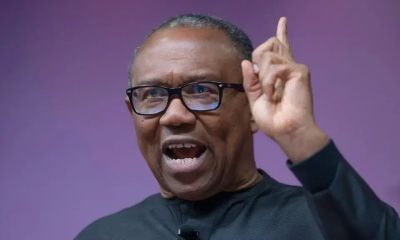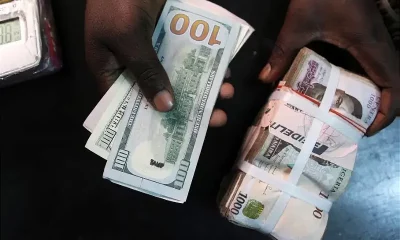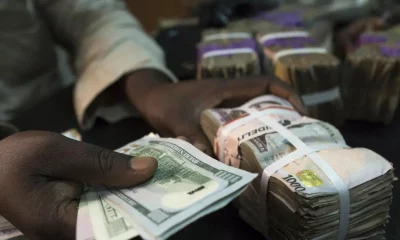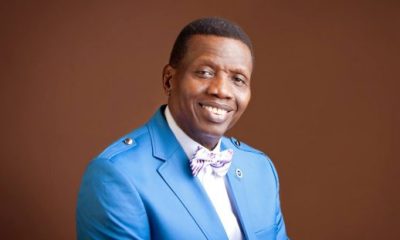Feature
Dollar is now the underground currency of Nigeria’s economy – Peter Obi
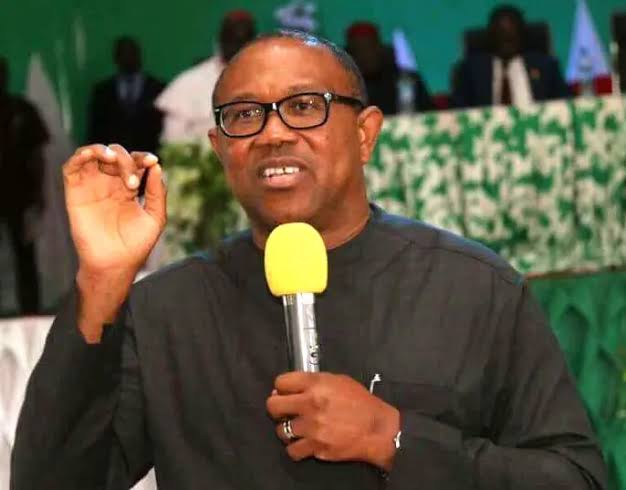
Businessman and presidential candidate of the Labour Party in the 2023 general elections, Peter Obi, has lamented the ‘dollarisation’ of the Nigerian economy.
According to Peter Obi, the naira has faded in significance as the use of the dollar in the country has led to unproductivity.
“Dollar has become the underground currency of our economy. It shouldn’t be. We have a currency called the naira. All the things people use dollars to do that are not productive should be removed.’ Obi told Arise TV on Monday, October 2.
“I can assure you that when you remove it, it can strengthen the currency. Today, even when you want to do party primaries, people share dollars. That is not our currency.
“There should be a stiff penalty in dealing with the issue. If people earn dollars legitimately, let them spend it the way they want. However, it has now become a means of corruption and criminality in our system.”
Peter Obi added that the country should work more on exports to strengthen the currency.
Feature
Can women be allowed breathing space in Nigerian politics?
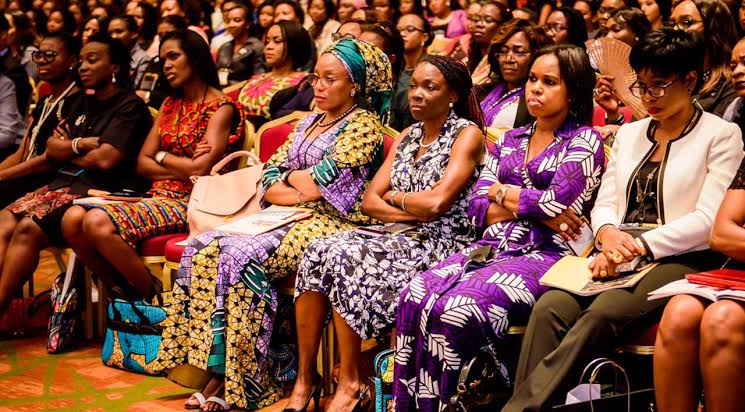
A news analysis by Emmanuel Oloniruha, News Agency of Nigeria (NAN)
Women have continued to play leading roles in the history and economic life of Nigeria since the pre-colonial period till today. They have been contributing immensely not only to the continuous growth and shaping of the family and the society, but also the nation in general.
During the struggle for independence from the British government, several women made a footprint in the annals of the successful freedom of Nigeria. Their contributions did not only define how Nigerians stood up to the colonialists, they also led several active political and socio-economic movements that culminated into Nigeria’s independence.
The circumstance, however, played out differently when the contributions of nationalists such as Anthony Enahoro, Nnamdi Azikiwe and Remi Fani-Kayode were acknowledged. The names of women like Funmilayo Ransome-Kuti, Hajia Gambo Sawaba, and Margaret Ekpo among others were conveniently relegated to the back stage.
Today, while most developed political systems in the world place a premium on women in their political affairs, Nigerian woman have continued to witness low participation in governance, even under democratic governance, a system of government expected to bridge the gap.
In the 10th National Assembly inaugurated on June 13, the numbers of women in both chamber of the Senate and House of Representative mirrored the dwindling level of their participation in politics.
In the Senate, out of the 109 senators only three are female, which was a reduction from the seven in the 9th Assembly. In the House of Representatives with 360 lawmakers, 16 women were sworn in, representing a slight increase when compared to 13 of them that made it to previous House.
The female lawmakers are from Anambra, Bayelsa, Benue, Borno, Delta, Imo, Ogun, Plateau, Lagos, Yobe and Oyo.
In the recent ministerial nomination by President Bola Tinubu, only seven women made the list. They are Hannatu Musawa, Betta Edu, Doris Aniche Uzoka, Nkiru Onyeojiocha, Stella Okotete, Uju Kennedy Ohaneye, and Imaan Ibrahim. This to some stakeholders is short of the affirmative action quota for women in politics.
The low number of women in both the elective and appointive political positions has continued to be a thing of growing concern which many analysts attributed to lack of political will among the men to accord women their rightful place as contained in several national and global declarations.
Some efforts, however, have been put to improve women participation in politics. In Nigeria, the extant National Gender Policy (NGP) recommends 35 per cent affirmative action and sought for a more inclusive representation of women in both elective political and appointive public service positions.
Analysts said the under representation of women in political participation gained root due to the patriarchal practice inherent in our society. However, the re-introduction of democratic governance in 1999 has witnessed once again an increase in women political participation.
The national average of women’s political participation in Nigeria has remained 6.7 per cent in elective and appointive positions, which is far below the Global Average of 22.5 per cent, Africa Regional Average of 23.4 per cent and West African Sub Regional Average of 15 per cent. Even with her 15 years uninterrupted democratic governance (1999-2015), Nigeria is yet to produce a female governor in any of the 36 states of the federation.
Other efforts to address the low representation of women in elective and appointive positions in Nigeria includes the establishment of Women Political empowerment office, Nigeria Women Trust Funds, Women Lobby Group, the institution of an INEC gender policy, the national multi stakeholder dialogue, initiation of several interventions to actualise affirmative action, and the convening of the Nigeria Women Strategy Conference.
Notably, Non-Governmental Organisations also played significant roles towards addressing the shortage of women participation in politics. All political parties now have the office of women leaders who play key roles in mobilising women during elections as well as propagate the relevance of women after the elections.
Similarly, fora and workshops are now common place to sensitise both the women and government/parties to make adequate representation of women a priority in governance.
The Goodluck Jonathan Foundation (GJF) is one of such NGOs advocating increase in women participation in politics. As a non-profit organisation, the GJF has been engaged in several advocacy for improved democracy, good governance and credible election in Nigeria, West Africa and at the continental level. One of its active bodies is the West African Elders Forum.
Over the years since its establishment, GJF has successfully implemented projects in Nigeria and various African countries targeted at building democratic accountability, strengthening governance and building leadership, as well as ensuring transparent and peaceful transition of power.
As parts of efforts to advance democratic consolidation on Africa continent, especially in West Africa, GJF instituted a home-grown, credible platform called the West African Elders Forum.
The forum, officially inaugurated on March 4, 2021, consists of former leaders and statesmen to provide mediation and interlocutory roles in addressing electoral and democratic conflicts in the region including the current disruptions occasioned by the COVID-19 pandemic.
At a workshop tagged ‘’Democracy and the Voice of Women,’’ the GJF questioned the many obstacles hindering the participation of women in politics. The Executive Director of GJF, Ann Iyonu, posited that women occupy less than 10 per cent of leadership positions worldwide.
Iyonu said it has become imperative to interrogate the gender bias with the aim of finding a solution to the challenge.
‘’We need to seek a just society where women have access to justice and can participate equally in the democratic process like their male counterparts.
‘’According to the UN, at this rate, gender equality will not be reached until 2150, that’s another 130 years, unless drastic actions are taken by all stakeholders.
‘’Women hold about 21 per cent of ministerial positions globally. Only three countries have 50 per cent or more female representation in parliament and 22 countries are led by women. Closing this gap is crucial to our activities as a foundation.
“The call for gender equality and women’s participation should not be seen as an agenda against men, but a call for inclusivity and collective responsibility for a peaceful and prosperous society,’’ she said.
Also at the workshop, Hon. Mulikat Akande-Adeola, former member of the House of Representative, said that international institutions were still paying lip service to the issue of gender inclusion and women’s participation in politics.
Akande-Adeola is a lawyer and politician. She was elected to the House of Representatives on the platform of the People’s Democratic Party representing Ogbomoso North, South and Orire Constituency in the year 2007. She was re-elected in 2011.
‘’There are other aspects of society where international institutions have actually made a difference, so why can’t they prioritise this issue?” she asked.
Akande-Adeola added that much could not be achieved without the participation and buy-in of men.
‘’We must be willing to carry women along and they too must be ready to participate in the process that will lead to women’s participation and gender inclusion.
“If we leave more than 50 per cent of the global population out of political participation, we cannot achieve anything.
‘’Also, women must have the appetite to be change makers and reject no for an answer,” she said.
Akande-Adeola added that the more women participate, the more the likelihood of their inclusion in the process.
“We have to move beyond being mere voters to challengers for positions of leadership,” she added.
To Dr Onyinye Onwuka, democracy is a system that allows full participation of persons in the political and decision making of the society at all times, irrespective of gender.
Onwuka is the Head of the Political Affairs and International Cooperation Division, Directorate of Political Affairs, Department of Political Affairs, Peace and Security, the ECOWAS Commission, in Abuja.
She stated, “Democracy is the government of the people, by the people and for the people. Who are the people? They are the men and women.
“So, it is important for us to have a level playing field for the other half of “the people” to be able to participate,” she said.
Akande-Adeola added that both the male and female folks were all guilty of the gender stereotype that had kept women on the fringes of political participation.
“We say all sorts of things, including the claim that politics is dirty and noble women shouldn’t participate in it.
“We also culturally divide roles for men and women, saying women belong to the kitchen, while men belong to the boardroom. That’s the mind-set we were mostly raised with,” she advised.
Akande-Adeola, however, said that mentorship was important in advancing the topic, advising women who have broken the “glass ceiling” to pull others up.
Another participant at the workshop, Biodun Baiyewu, Executive Director, Global Rights, was also of the view that to increase women participation in political and appointive positions, the mindset and long stereotype about gender must be addressed.
‘’We need to revisit our history as a people. We have systems that, generation after generation, tell women to be ambitious, but not more ambitious than their male siblings or husbands.
“There are many instances, in a committee, a man can be chosen as chairman and then they will say ‘let us select a woman as the secretary’.
‘’It is the same mindset of tokenism that we take into governance. You are not a democracy yet when half of your people can’t hold a significant number of leadership positions.
“We need to get it into our heads that we are all first human beings before we are a particular gender. Hence, we are all deserving of leadership positions.’’
Jude Ilo, Founder, Natasha Ilo Foundation, called for a concerted effort to enforce various adopted actions to increase women political participation.
Ilo said that while some progress had been recorded with regards to awareness and consciousness, it was time for their enforcement across board.
‘’We have to look at enforcing some of the affirmative actions against those factors that are holding women down.
“Access to land, access to inheritance, and access to credit are some of the empowerment possibilities which give women economic empowerment.
‘’When you take away something as basic as access to inheritance from women, you are making it impossible for millions of women to speak for themselves,” she said.
Political analysts believe that women’s representation in Nigerian politics has been on a downward slide since 2011, while the 2023 elections confirmed the expectations of poor outcomes for women.
They argued that concerted efforts are needed to achieve the affirmative action taken at the Beijing Conference in order to allow more women participation.
To achieve this, all stakeholders: governments, NGOs and civil societies as well as religious groups, must rise up to work with the women in fulfilling their other half of the bargain in national and international development.
Feature
Can Tinubu administration tame job racketeering in MDAs?
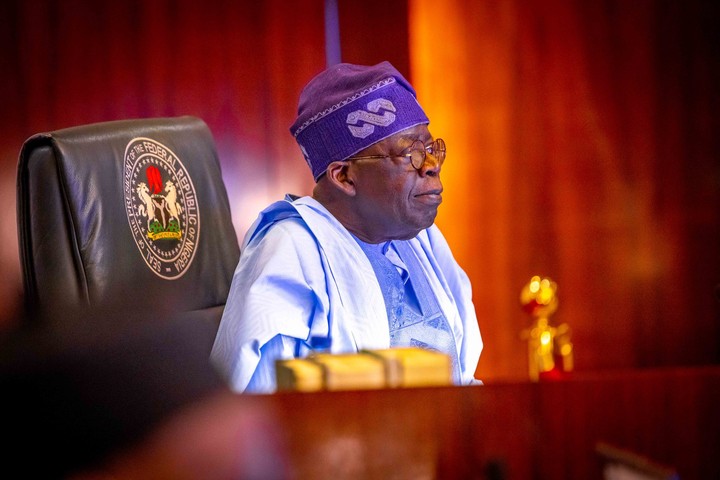
An analysis by Femi Ogunshola, News Agency of Nigeria (NAN)
Nigeria has one of the highest unemployment rates in Africa. According to National Bureau of Statistics (NBS), Nigeria’s unemployment rate stood at 33.3 per cent in the last quarter of 2020 while the rate of unemployment among youths was even higher, 42.5 per cent.
The NBS further says that as at the time the figures were released, under-employment was 22.8 per cent and youth unemployment was 21.0 per cent.
However, KPMG, a multi-national consulting firm, in a release predicted that Nigeria’s unemployment rate will hit 40.6 per cent in 2023.
“Although the National Bureau of Statistics recorded an increase in the national unemployment rate from 23.1per cent in 2018 to 33.3per cent in 2020.
“We estimate that this rate has increased to 37.7per cent in 2022 and will rise further to 40.6 per cent in 2023“, said KPMG in its Global Economy Outlook report for first half of 2023.
Nigeria’s unemployment figure is outrageous compared to that of Ghana which, according to a BBC report, was 13.7 per cent in the 3rd quarter of 2022.
The scarcity of job means that unemployed people can go to any length to secure a job and top officials in Ministries, Departments and Agencies (MDAs), take advantage of applicants, exploiting them both financially and morally.
In some instances, job seekers are allegedly offered phantom jobs, enrolled into and collect salaries from the centralised Federal Government salary payment platform, Integrated Payroll Personnel Information System (IPPIS).
Worried by this situation, the House of Representatives set up an Ad hoc Committee to investigate job racketeering in MDAs and so far reports from the committee’s sittings have been mind-boggling.
In one of the sessions of the committee witnesses Abdulmalik Ahmed and Ali Yaro shared their experiences of being swindled by individuals posing as intermediaries for an agency.
The two witnesses on Aug. 8 presented themselves before the committee which is also probing the mismanagement of IPPS by those in charge of its operations.
They testified how a former staff of the Federal Character Commission (FCC), Mr Haruna Kolo, who double as the IPPIS desk officer and ex-protocol person to the Commission’s chairman, Mrs Farida Dankaka, swindled unsuspecting job seekers,
He was alleged to have acted as a proxy to the chairman.
Kolo, now a staff of Asset Management Company of Nigeria (AMCON), in his submission before the committee said his movement to AMCON was facilitated by Dankaka along with three others, which he said included the FCC chairman’s 51 year old sister.
He alleged that the chairman’s sister was rejected at AMCON on account of her age, which according to him.
He claimed Dankaka blamed him for not doing enough to convince AMCON management to accept her.
On his part, Ahmed, an indigene of Adamawa, and the only graduate from the family of 21 said he was ready to part with any amount to secure a job in any Federal Government when presented with the opportunity.
He said the driver to the Federal Commissioner, representing Taraba took him to Kolo, the protocol officer to the chairman of the commission into whose account he paid N1 million for the purpose of giving him a job in the commission.
Yaro, also from Adamawa paid even higher, paying N2 million into Kolo’s account in a bid to secure the federal government job.
“I graduated 11 years ago without a job. I had the privilege of joining the dreaded Boko Haram but I wanted to be a good citizen. So, I thought it was better to pay the N2 million to secure a job than offering myself as a tool for Boko Haram“, he told the committee.
Rep. Yusuf Gagdi, the chairman of the committee said no stone would be left unturned to get justice for the victim.
A visibly angry Gagdi said it was unfortunate that one of the heads of an MDA, after obtaining waiver for recruitment, resorted to a secret recruitment.
Gagdi said MDA’s use waiver to bypass recruitment guidelines, sell jobs to the highest bidders, and engage in fraudulent activities, adding that they perpetrate job racketeering, which undermine the principles of fairness and transparency in recruitment processes.
He described the act as a deliberate effort to engage cronies and sell the slots to willing graduates, while some of highly placed official move their children from one MDAs to the other depending on how `lucrative` the MDA is.
Some of the MDAs considered as lucrative includes: the Central Bank of Nigeria, Nigeria National Petroleum Company Ltd., Nigeria Communication Commission.
Meanwhile, at the investigative hearing, one of the FCC Commissioners representing Delta State , Mr Moses Anaughe’s accused the chairman of the commission of moving her children from NCC to Downstream Regulatory Commission, a subsiduary of NNPC where the pay is higher.
She did not deny the allegation.
Some FCC Commissioners such as those from Lagos, Delta, Osun, Rivers, Enugu even Dankaka’s state, Kwara, among others are up in arms against her, accusing her of selling job slots in dollars using Kolo and her sister as the receiving agents.
Account details where job seekers paid into were provided to the committee with names and beneficiaries, but Dankaka denied any wrong doing.
Swearing with the Holy Quran she said she had discharged her duties to the best of her abilities and never collected money from any applicant personally or through any proxy.
Pundits are of the opinion that if these allegations from the Ad hoc committee settings are true, the President Bola Tinubu administration has a lot to do to clean up the civil service.
They also urge that similar probes be extended to other MDAs in order to determine the extent of the rot and bring culprits to book.



